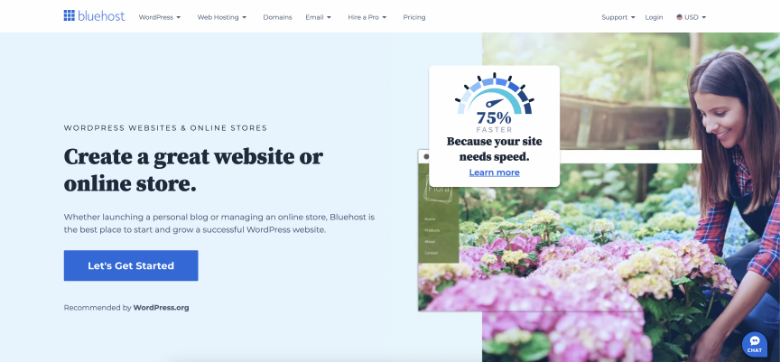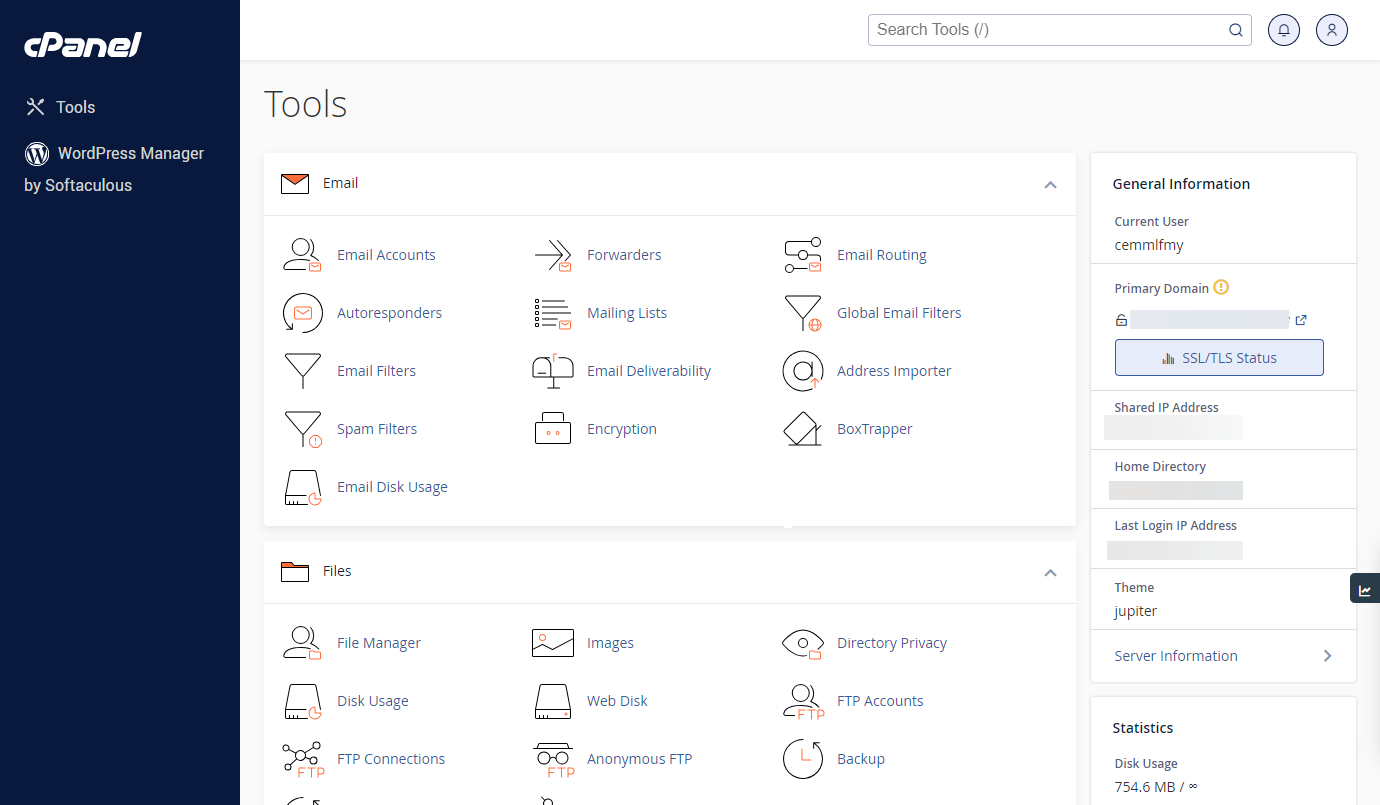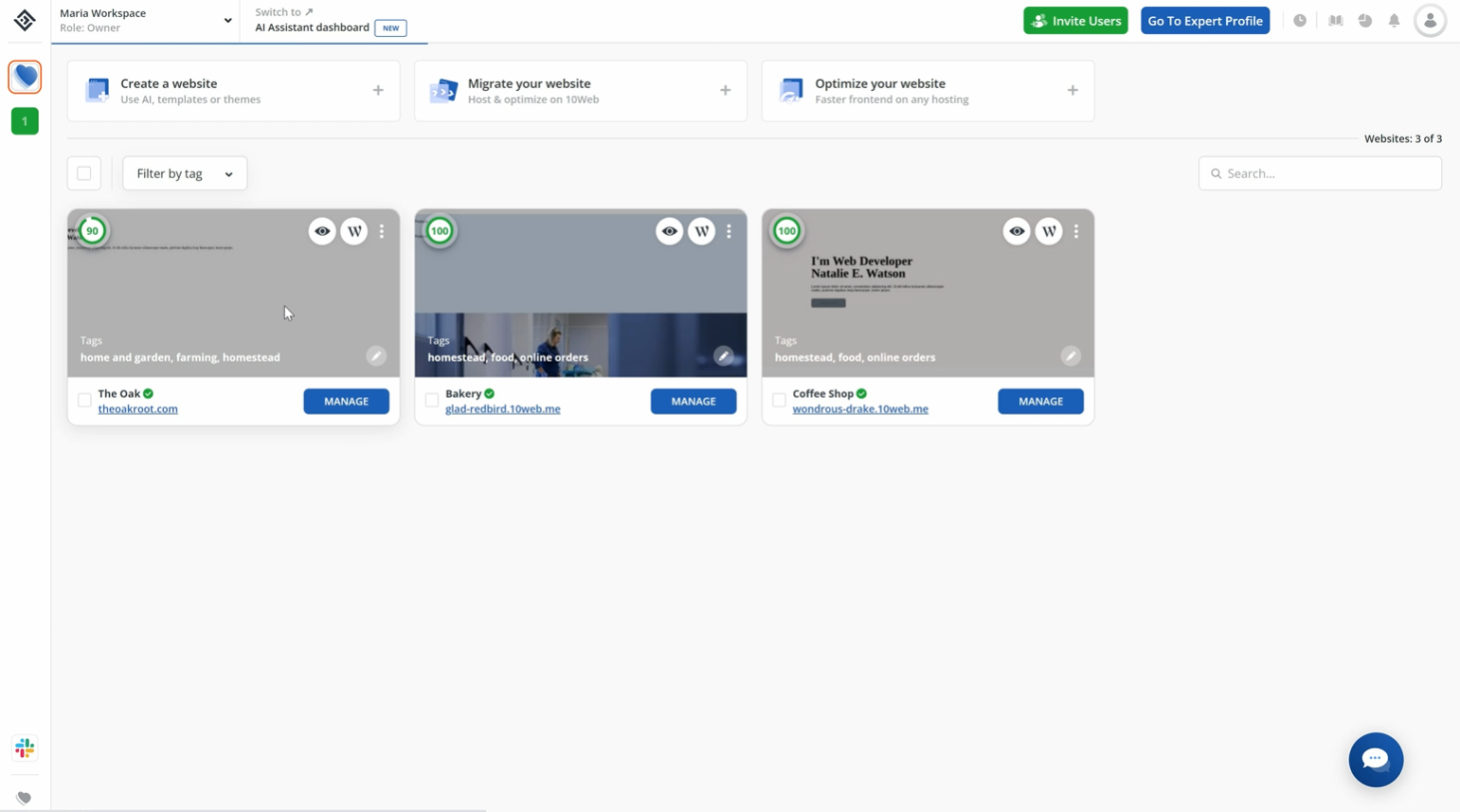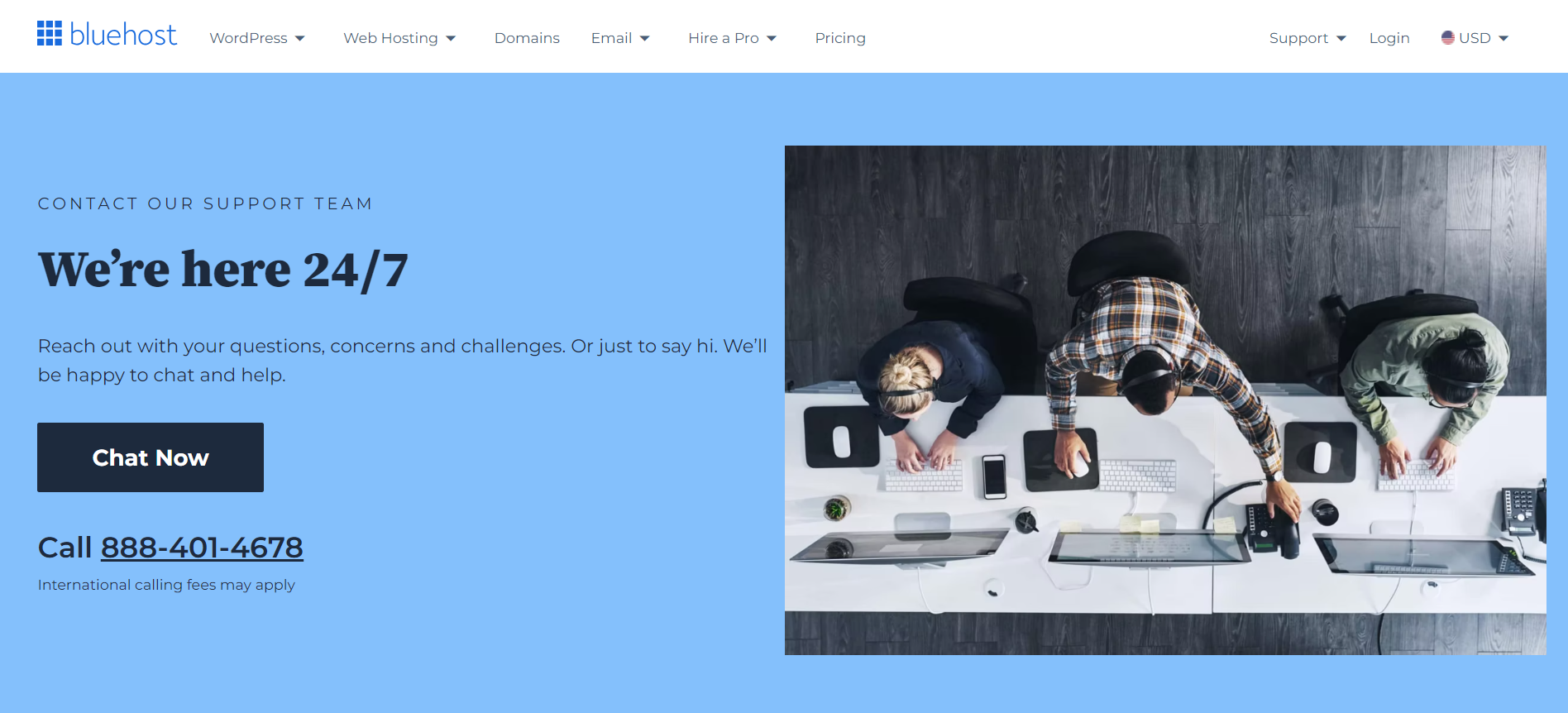10Web vs Bluehost: Final verdict
Looking over 10Web vs. Bluehost, both providers exhibit notable strengths in various aspects of web hosting, but they cater to different user needs.
-
Bluehost (Overall grade: 8.2)
offers a broad range of hosting options, including shared, VPS, and dedicated hosting, making it a versatile choice for various use cases. Its strong performance, near-perfect uptime, and competitive website speed are well-suited for high-traffic websites and those needing scalable solutions. While it excels in reliability and ease of use, especially for WordPress users, some drawbacks include fluctuations in uptime and mixed user feedback regarding customer support and occasional pushy sales tactics. -
10Web (Overall grade: 8.8)
stands out for its superior technical and operational security measures, leveraging advanced Google Cloud infrastructure and features like automatic scaling and AI-enhanced website building. It excels in providing exceptional value with automated backups, enhanced caching, and dedicated Slack support channels. Its detailed role management and comprehensive compliance transparency add to its appeal for agencies and high-traffic sites. However, its lack of shared and VPS hosting options might limit certain user needs. The platform’s streamlined user interface and focus on performance make it an optimal choice for those requiring high customization and reliability.
 Overall grade:8.8 |
 Overall grade:8.2 |
|
|---|---|---|
| Uptime and Availability | 9.7 | 9.0 |
| Hosting Performance | 8.6 | 8.9 |
| Hosting Security | 8.6 | 8.1 |
| Price | 8.8 | 8.1 |
| Hosting Features | 7.7 | 7.0 |
| Ease Of Setup | 9.1 | 8.6 |
| User Management | 8.6 | 8.0 |
| Customer Support | 9.3 | 7.9 |
| User feedback | 4.5/5 | 3.5/5 |
Hosting types offered
Both platforms provide a variety of hosting types, each designed to meet the different needs of users.
 |
 |
|
|---|---|---|
| Shared hosting | ||
| Cloud hosting | ||
| WordPress hosting | ||
| Ecommerce hosting | ||
| VPS hosting | ||
| Dedicated hosting |
Although both offer a variety of hosting plans tailored to different needs, in
certain cases, one platform may prove to be more suitable.
Detailed comparison
Uptime and availability
Evaluates the average uptime statistics, uptime guarantee and overall availability of the hosting
provider
Score Components:
- Uptime percentage (30%): evaluates the uptime statistics in given period of time
- Uptime guarantee (20%): Assesses if the platform offers an uptime guarantee and
whether the actual uptime matches the promised guarantee. - General performance (25%): Evaluates how fast is the average response time and overall
it’s stability. - Responsiveness (10%): Adaptability to different devices and screen sizes.
- Availability (25%): Reflects the total downtime and number of outages.
 9.7
9.7
 9.0
9.0
🏆 Winner 10Web: Delivers a closer-to-perfect uptime with enhanced infrastructure.

10Web guarantees a 99.99% uptime by leveraging Google Compute Engine for its hosting services. The platform benefits from multiple data centers worldwide, premium Google Cloud servers, and next-generation infrastructure. This includes SSD storage, Nginx, FastCGI caching, LXD containers, and the latest PHP version to ensure each website operates independently and securely.

Bluehost has shown consistent performance with near-perfect uptime in various tests and reviews. With a range of SLA agreements promising account credits for downtime and solid performance under traffic loads, Bluehost remains a strong contender. However, its varied uptime metrics of 99.95% in 2022 and 99.63% during a 30-day test period indicate slight fluctuations compared to 10Web’s steadier performance.
Which one has better hosting performance?
Score Components:
- Hosting speed (30%): This includes SSD quality, Load times, PageSpeed score ranges,
additional information on website speed, built-in plugins for performance enhancement, available caching
methods, and CPU/RAM options - CDN (20%): Considers whether CDN is available or not, whether it’s free or paid, and
the quality of the CDN service - Available data centers (30%): Evaluates the number of data centers and their locations
globally. - Scalibility (20%): Looks at whether elastic scaling is available, the process required
to scale (manual upgrade vs. automatic scaling), the presence of dedicated servers, and the costs
associated with scaling.
 8.6
8.6
 8.9
8.9
🏆 Winner: Bluehost: Delivering reliable, high-performance web hosting.
When evaluating general performance, Bluehost and 10Web both showcase strong features. Bluehost is known for its top-tier site speed and guaranteed 100% network uptime for cloud hosting, utilizing SSD storage for reliability and speed. It offers a built-in CDN in all plans to optimize global image delivery and server caching. With a range of hosting plans, users can select services that include increased CPU and scalable PHP workers. Bluehost’s multiple global data centers further ensure low latency. On the other hand, 10Web taps into Google Cloud’s best servers, SSDs, and advanced technologies like Nginx and FastCGI caching to provide impressive performance. It offers a Cloudflare Enterprise CDN, boasts a 99.99% uptime, and excels in automated frontend optimization and security features.
Website Speed
For website speed, Bluehost is rated as a leading WordPress provider with high-speed capabilities and SSD storage that aids in reducing load times. Bluehost’s built-in CDN and optimized infrastructure with scalable PHP workers enhance overall performance, enabling sites to process more requests swiftly. 10Web also focuses on speed with a guaranteed 90+ PageSpeed score, leveraging CSS, HTML, and JS minification, and lazy loading of images and videos. Both services aim to minimize load times effectively, but Bluehost’s optimized infrastructure and globally distributed data centers provide a slight edge.
Scalability
When it comes to scalability, Bluehost and 10Web handle it differently. Bluehost offers elastic scaling between shared, VPS, cloud, and dedicated hosting plans, accommodating various needs from personal blogs to high-traffic websites. Each upgrade provides more resources, but the cost specifics of scaling are not detailed. 10Web, on the other hand, features instant resource ramp-up, which allows automatic adjustment to traffic spikes without needing a manual upgrade, costing only $2 for every extra 10,000 visitors or 5GB SSD storage. This automatic scaling paired with detailed cost structuring gives 10Web a practical scalability approach that caters to sudden traffic surges efficiently.
Which one has better security features?
and regulatory requirements
Score Components:
- Technical security measures (40%): This includes encryption, firewalls, DDoS
protection, secure configurations, server monitoring, access control and availability of security addons
(e.g Sitelock security). - Operational security measures (30%): Encompasses data privacy, backups and data
redundancy. - Compliance and certifications (20%): Adherence to legal and regulatory requirements
(e.g., GDPR, HIPAA) and possession of certifications (e.g., ISO 27001, SOC 2). - Business and reliability (10%): Factors in the provider’s reputation, uptime
guarantees, and customer support.
 8.6
8.6
 8.1
8.1
🏆 Winner
10Web: Offers a superior range of automatic security measures and comprehensive privacy protections.
Technical security measures:
10Web and Bluehost both provide essential technical security features, but they differ in implementation and comprehensiveness. 10Web offers free SSL certificates from Let’s Encrypt, automatic SSL renewals, and supports the latest PHP versions. 10Web ensures PHP versions are managed through a dashboard, focusing on ease of management. In contrast, Bluehost provides free and premium SSL options with different levels of warranty and allows PHP workers for resource allocation in cloud hosting plans. Both hosts offer data encryption, but 10Web also encrypts backups and only stores encrypted hashes of credentials. Malware protection in 10Web includes weekly scans, while Bluehost relies on SiteLock for malware detection. Overall, 10Web’s automated security processes give it an edge in technical measures.
Operational security measures:
10Web excels in operational security by implementing automated daily backups stored on Amazon S3 and separate disks. It has robust network security measures like complete isolation of WordPress sites using Linux containers and continuous 24/7 monitoring. Two-factor authentication and strong password policies are enforced rigorously. In comparison, Bluehost provides automated daily backups via Jetpack, DDoS protection, a Web Application Firewall, and two-factor authentication. Although both provide comprehensive security, 10Web’s detailed and layered approach to backup, monitoring, and isolation stands out.
Compliance and certifications:
10Web is transparent about its compliance with GDPR and uses PCI DSS compliant payment processors like PayPal and Stripe. However, detailed GDPR compliance information is forthcoming, and HIPAA compliance is not specified. 10Web maintains a set of security policies to ensure regulatory adherence. Bluehost complies with GDPR, while PCI compliance is partial, requiring additional steps for shared hosting plans but achievable on VPS and Dedicated servers. HIPAA compliance is not specified for either provider. With clearer compliance documentation, 10Web gains a slight advantage.

|

|
|
|---|---|---|
| SSL certificate | Free SSL, automatic renewal | Free SSL, Premium SSL with Comodo warranty |
| Additional security features | Firewall, 24/7 monitoring, malware scanning, two-factor authentication, login attempt limiter, backup & recovery | Firewall, DDoS protection, Jetpack backups, above features, images encryption |
| PHP versions | Latest versions, managed via dashboard | PHP workers (vCPUs) |
| GDPR compliance | Statement coming soon | Compliant |
| HIPAA compliance | Not specified | Not specified |
| PCI compliance | Compliant via PCI DSS processors | Partial compliance, details vary |
Hosting features
Score Components:
- Domains (20%): Assesses the availability of a free domain, domain purchase options, and
pricing - Email (15%): Considers if the provider offers full email hosting, or is reselling
third-party service, and if the email is only transactional or not - Website builder (15%): Checks if website builder is available, and it’s user
friendliness and overall the level of customization allowed. - Staging environment (20%): Determines if a staging environment is available, allowing
for testing changes before going live. - FTP & SFTP accounts (10%): Evaluates if and how easily users can access FTP and
SFTP accounts - Git and SSH access (20%): Assess whether Git is integrated into the hosting service and
if SSH access is provided
 7.7
7.7
 7.0
7.0
🏆 Winner 10Web: A versatile and high-performing managed WordPress hosting solution.
When comparing 10Web and Bluehost, both providers offer distinctive features catering to varied customer needs. For users seeking simplicity and ease of use, Bluehost’s offered website builder might seem appealing with its basic and user-friendly interface, suitable for quick site creation and AI integration. However, 10Web stands out with its AI-powered website builder, which not only simplifies the development process but also allows for advanced customization and content creation directly within the Elementor editor. Free services from both providers include domain registration for the first year and SSL certificates, adding baseline security and credibility to your site. User considerations also include Bluehost’s domain registration policies and potential renewal fees compared to 10Web’s automatic backups and consistent performance enhancements.
10Web’s enhanced features like elastic scaling, advanced caching, and Cloudflare Enterprise CDN offer superior performance and reliability, especially for high-traffic websites. For developers, 10Web provides diverse tools like PHP, SSH, and phpMyAdmin control with a single click, enhancing its appeal for more technically inclined users. Bluehost’s shared and VPS hosting options, while practical, do not offer the same developer-focused flexibility or staging environments for testing new changes before implementation. This balance of features and capabilities suggests 10Web may be better suited for users needing higher customization, performance, and reliability, whereas Bluehost would cater to those seeking straightforward and cost-effective hosting solutions.
 |
 |
|
|---|---|---|
Free domain |
Yes, for the first year |
Yes, for the first year |
Free SSL |
Yes |
Yes, for the first year |
Email hosting |
Yes, but third-party |
Yes, via Google Workspace |
Website builder |
Yes, AI-powered |
Yes, AI-integrated |
Staging environment |
Yes |
Not specified |
FTP & SFTP accounts |
Yes |
Not specified |
Git and SSH access |
Yes |
Yes |
Free backup |
Yes, automatic |
Yes, for the first year |
Money-back guarantee |
Not specified |
Yes |
a location.
As a result in rare cases the features mentioned here can differ from the ones you see on their websites.
Both providers support a range of users from beginners to experts with user-friendly website builders and WordPress staging areas. However, in terms of developer tools, both 10Web and Bluehost offer robust options including SSH access, support for multiple programming languages, and Git for version control, thus appealing to developers looking for advanced capabilities.
Email services:
10Web includes email hosting via third-party services, allowing the setup of business emails but lacking integrated marketing capabilities. Bluehost, on the other hand, provides more extensive options for email hosting with integrations such as Google Workspace, enabling scalable email campaigns and management. Transactional email capabilities and spam filtering are efficiently handled through these third-party services, offering more robust solutions for email communication needs.
Price
Score Components:
- Plan value (40%): What each pricing tier offers.
- Transparency and clarity (30%): Clearness of pricing structures.
- Flexibility of plans (20%): Range of options to suit different budgets.
- Hidden costs (10%): Additional expenses not included in the plan.
 8.8
8.8
 8.1
8.1
🏆 Winner
10Web: Offering an extensive array of AI-driven tools and high-performance infrastructure, 10Web has a slight edge in hosting services.
Evaluating the pricing of plans among various hosting providers can be complex due to their differing pricing and renewal strategies. Additionally, certain plans require annual commitments, which adds to the difficulty of making comparisons. The prices listed are based on monthly commitments; plans requiring annual commitments are indicated. Additionally, although some providers offer identical plans for WordPress and shared hosting, we have created separate tables for each to enhance clarity.
Comparing the pricing plans of 10Web and Bluehost, 10Web uniquely integrates AI tools across its plans, enhancing website performance and management. Their WordPress and Cloud hosting plans start from $10/month and $10/month respectively with rich features like AI content generation, real-time backups, and Google Cloud infrastructure. Bluehost, on the other hand, offers more affordable shared hosting starting at $2.95/month, yet with limitations like introductory pricing terms and fewer advanced tools. Bluehost’s VPS and Dedicated Hosting plans are straightforward with unmetered bandwidth but can get expensive upon renewal. Both hosts offer comprehensive support, but 10Web’s real-time and priority support options stand out, particularly in the higher-tier plans.
 |
 |
|---|---|
|
AI Starter $20
1 Website, 10GB SSD storage, 10K visitors, 24/7 live chat, Free custom domain, SSL, AI tools Value for price:8.5
|
Basic $10.99
1 Website, 10 GB SSD storage, AI Tools, Daily backups (1st year), SSL, Free domain (1st year) Value for price:8.0
|
|
AI Premium $30
1 Website, 15GB SSD storage, 50K visitors, 24/7 live chat, Enhanced support, Free custom domain, SSL, AI tools Value for price:8.6
|
Plus $14.99
Unlimited Websites, Unmetered SSD storage, AI Tools, Daily backups (1st year), SSL, Free domain (1st year) Value for price:8.4
|
|
AI Ultimate $45
1 Website, 20GB SSD storage, 200K visitors, 24/7 live chat, VIP support, Free custom domain, SSL, AI tools Value for price:8.8
|
Choice Plus $18.99
Unlimited Websites, Unmetered SSD storage, AI Tools, Daily backups (1st year), SSL, Free domain (1st year) Value for price:8.4
|
 |
 |
|---|---|
|
N/A
|
Basic $10.99
1 Website, 10 GB SSD storage, AI Tools, Daily backups (1st year), SSL, Free domain (1st year) Value for price:8.0
|
|
N/A
|
Plus $14.99
Unlimited Websites, Unmetered SSD storage, AI Tools, Daily backups (1st year), SSL, Free domain (1st year) Value for price:8.4
|
|
N/A
|
Choice Plus $18.99
Unlimited Websites, Unmetered SSD storage, AI Tools, Daily backups (1st year), SSL, Free domain (1st year) Value for price:8.4
|
|
N/A
|
Pro $28.99
Unlimited Websites, Unmetered SSD storage, AI Tools, Daily backups (1st year), SSL, Free domain (1st year), Optimized for high traffic Value for price:8.6
|
 |
 |
|---|---|
|
AI Starter $20
1 Website, 10GB SSD storage, 10K visitors, 24/7 live chat, Free custom domain, SSL, AI tools Value for price:8.5
|
Cloud 1 $79.99
1 Website, 10GB SSD storage, 2 vCPU, 24/7 priority support, 100% uptime Value for price:7.8
|
|
AI Premium $30
1 Website, 15GB SSD storage, 50K visitors, 24/7 live chat, Enhanced support, Free custom domain, SSL, AI tools Value for price:8.6
|
Cloud 10 $109.99
10 Websites, 125GB SSD storage, 20 vCPU, 24/7 priority support, 100% uptime Value for price:8.0
|
|
AI Ultimate $45
1 Website, 20GB SSD storage, 200K visitors, 24/7 live chat, VIP support, Free custom domain, SSL, AI tools Value for price:8.8
|
Cloud 25 $169.99
25 Websites, 175GB SSD storage, 75 vCPU, 24/7 priority support, 100% uptime Value for price:8.1
|
As a result in rare cases the prices displayed here can differ from the ones you see on their websites.
Enterprise plans
For enterprises, 10Web offers customizable plans like the Agency Ultimate and Dedicated Hosting, focusing on security, real-time backups, developer-friendly tools, and AI-powered features. These plans are well-suited for agencies managing multiple sites or high-traffic e-commerce platforms. Bluehost’s Dedicated Hosting plans, starting at $79.99/month, provide up to 16 GB RAM and offer scalable server solutions ideal for large-scale operations requiring robust resources. Thus, 10Web’s flexibility and support options make it a compelling choice for comprehensive enterprise needs.
10Web vs Bluehost: Ease of setup
platform.
Score Components:
- Site migration (25%): Assesses whether the provider offers tools for site migration,
either automated or manual, and whether these services are free or require a fee. - Admin panel usability (35%): Evaluates the type of admin panel provided, such as the
standard cPanel or a custom solution, focusing on its accessibility and user-friendliness for both
technical and non-technical users. - Setup features (20%): Examines the availability and ease of use of various setup
features, including FTP accounts, file managers, email account setup, PHPMyAdmin, and easy CDN
configuration. - Help center quality (20%): Measures the quality and accessibility of the provider’s
help center resources, including articles and tutorials.
 9.1
9.1
 8.6
8.6
🏆 Winner 10Web: A powerful and user-friendly hosting solution offering seamless website management and migration.
10Web offers a streamlined dashboard with powerful tools designed for easy website management. Its admin panel is highly user-friendly, accommodating both technical and non-technical users alike. The dashboard features an AI Website Builder, which allows users to create unique websites quickly, and a one-click staging environment for safe experimentation. It also provides real-time backup and automatic updates that make it convenient for maintaining a WordPress website. On the other hand, Bluehost uses AI WonderSuite tools designed to simplify site creation and management. Its guided setup process and simple setup wizard for online stores make it easy for newcomers to get started. Automatic WordPress installation is another hassle-free feature, ensuring secure and updated websites right from the start.

Both hosting providers offer automated migration tools. 10Web’s fully automated 1-click migration simplifies moving a site to their platform, requiring minimal user intervention. Bluehost also provides various migration services, though these may involve additional costs. Both options aim for ease of use, with automated processes designed to reduce migration complexity.

10Web’s help center offers extensive resources, including getting started guides, troubleshooting tips, and a dedicated Slack channel for direct support from engineers. The platform also provides 24/7 live chat support and a public roadmap for community interaction. Bluehost’s knowledge base includes detailed articles, 24/7 expert support via chat, phone, and email, and specific resources for WordPress users. Both providers emphasize accessibility and comprehensive support, but 10Web’s dedicated Slack channel provides an extra layer of direct technical assistance.
The platforms provide extensive knowledge bases filled with guides, how-to articles, and instructional content. 10Web offers a wide range of resources alongside 24/7 chat and phone support. Bluehost also boasts a detailed help center with an intuitive search function and around-the-clock support via live chat, phone, and ticketing, ensuring comprehensive user support.
User management
accessibility.
Score Components:
- Role customization (40%): Flexibility in creating and defining user roles and
permissions. - Ease of management (30%): User interface and tools for managing users.
- Access control (20%): Effectiveness of access control measures for different user
levels. - Scalability (10%): Ability to manage a growing number of users efficiently.
 8.6
8.6
 8.0
8.0
🏆 Winner 10Web: A comprehensive solution for user and team management, offering streamlined control and flexibility.
10Web and Bluehost both provide structured methods to manage user roles and permissions, but they differ significantly in flexibility and depth. 10Web features granular user role customization, with predefined roles including Account Owner, Admin, Contributor, and Member, allowing for detailed access and responsibility settings. In contrast, Bluehost offers three primary roles—Primary Contact, Admin Contact, and Tech Contact—focused more on account-level management. 10Web’s Role Manager further enhances flexibility by enabling custom permissions based on WordPress roles, allowing more tailored access.
In terms of interface and tools for managing users, 10Web offers a user-friendly dashboard where user and team management are seamlessly integrated. Adding or removing users is straightforward, with clear options to specify roles and site access levels. Invitations and user status updates are easily managed from the dashboard. Bluehost, while providing a solid user management interface, has a more centralized approach through their Account Manager. Task flow for adding users involves more steps, but functionalities like editing roles and permissions are accessible and logically organized.
Regarding access control measures and scalability, 10Web shines with its efficient user and team management system. The ability to switch between workspaces enhances its suitability for managing multiple projects and team members effectively. The platform’s detailed role distinctions allow for precise control even as the user base enlarges. Conversely, Bluehost’s focus on account-centric roles suits organizations preferring tight administrative oversight but might lack the nuanced control mechanisms needed for larger teams with diverse roles.
10Web user roles table:
| Role | Description | Access highlights |
|---|---|---|
| Account Owner | Full permissions including account settings and user management | Can manage all aspects including account settings, user/team management, and migration |
| Admin | Complete access to the workspace except user management | Can add/remove websites, manage DNS, subscription plans, billing, etc. |
| Contributor | Manages websites excluding user management and billing | Can add, remove, and manage all websites without access to white label or billing |
| Member | Specific website access for developers or clients | Access to selected websites’ live or staging environments only |
Bluehost user roles table:
| Role | Description | Access highlights |
|---|---|---|
| Primary Contact | Main communicator, responsible for high-level account decisions | Can edit account/primary contact info, payment info, user roles, and purchase/manage products |
| Admin Contact | Manages other users and account settings | Can edit payment info, user roles, purchase/manage products, and renew services |
| Tech Contact | Handles technical configurations and API access | Manages products/services, renews services, and edits WHOIS info |
Customer support
hosting provider.
Score Components:
- Support communication channels (30%): Measures the variety of customer support types
provided (live chat, chatbot, email, phone, etc.) - Availability (20%): Assesses the availability hours for each channel, including 24/7
support options. - Technical support quality (30%): Assesses whether the provider offers comprehensive
technical support, including hardware upgrades (e.g., HDD to SSD), software installations, and web
server configuration changes. - Enterprise support (20%): Checks if there are dedicated or priority support services
for enterprise-level customers.
 9.3
9.3
 7.9
7.9
🏆 Winner 10Web: Superior customer service with multiple channels and high satisfaction rates.
 |
 |
|
|---|---|---|
Phone support |
||
Live chat support |
||
Chatbot |
||
Email/ticket support |
||
Enterprise support (dedicated agent, priority support) |

10Web and Bluehost both provide 24/7 live chat support, but 10Web excels with additional support channels like email/ticket support, a dedicated Slack channel, and VIP priority support. They handle over 25,000 tickets annually with an average NPS score of 70 and maintain a 98% chat support satisfaction rate. Their extensive help center, with over 700 guides, further aids users in resolving their issues efficiently.

Bluehost, on the other hand, focuses on live chat and phone support, having recently eliminated ticket-based support to streamline their help system. While they offer dedicated support for specific hosting types and have a robust multi-server management system, their customer feedback is mixed, citing inconsistencies and long wait times. They offer a 30-day money-back guarantee and free domain for the first year, but some users report pushy sales tactics.
10Web vs Bluehost: User feedback
Overall, users have highly praised this hosting provider for its exceptional customer service, noting the responsiveness and expertise of the support team. The platform is user-friendly, with features like AI-driven website building, easy site migrations, and integration with WordPress being standout points. While most reviews are positive, highlighting the ease of use and effective solutions provided by the support team, a few users mentioned occasional issues with plugins and a slightly higher cost compared to other providers. However, the advanced tools and customer support quality make it a valuable partner for businesses.
User feedback on Bluehost as a hosting provider is highly mixed. On the positive side, many users commend their affordable pricing, ease of use with WordPress integration, and the comprehensive range of features such as free domain names, SSL, and excellent customer support. However, numerous reviews criticize the service for frequent outages, technical support issues, hidden fees, and unreliable performance, which have significantly impacted users’ businesses. Additionally, complaints about complicated navigation, aggressive upselling, and a steep learning curve for first-time users are common. While some users find Bluehost reliable and cost-effective, others have had severely negative experiences, citing problems like non-functional websites, billing issues, and inadequate customer service.
10Web vs Bluehost: FAQ
Which platform is better suited for hosting WordPress websites?
10Web stands out for WordPress hosting with its AI-powered website builder, automatic scaling, and advanced caching features. It guarantees a 90+ PageSpeed score and leverages Google Cloud infrastructure for superior performance. While Bluehost also offers robust WordPress hosting optimized for speed and includes features like free SSL and a built-in CDN, 10Web provides more advanced customization options and AI tools tailored for WordPress users.
Which hosting service offers better security features?
10Web excels in security with automated SSL renewals, PHP version management, encrypted backups, and detailed operational security measures like 24/7 monitoring and isolated containers. It also enforces rigorous two-factor authentication and strong password policies. Bluehost offers solid security features like free and premium SSL certificates, SiteLock for malware detection, and DDoS protection, but 10Web’s comprehensive and automated approach provides a slight edge.
Which platform offers better customer support?
10Web offers multiple support channels, including 24/7 live chat, email/ticket support, a dedicated Slack channel, and VIP priority support, with a high satisfaction rate and NPS score of 70. Bluehost provides 24/7 live chat and phone support but has eliminated ticket-based support. Although both offer robust support, 10Web’s varied support channels and dedicated Slack for direct technical assistance make it superior.
Which service is more suitable for hosting a high-traffic website?
Bluehost is better suited for high-traffic websites with its flexible VPS and dedicated hosting options that offer increased CPU and scalable resources. Its optimized infrastructure includes SSD storage and a built-in CDN to handle high traffic loads efficiently. While 10Web provides excellent performance and automatic scaling for high traffic, its lack of VPS and dedicated hosting options makes Bluehost the more suitable choice for high-traffic sites.
How do the providers handle email hosting and what features are included?
10Web includes email hosting via third-party services, allowing business email setup but lacking integrated marketing capabilities. Bluehost provides more extensive email hosting options through integrations like Google Workspace, facilitating scalable email campaigns and management. Bluehost efficiently handles transactional email capabilities and spam filtering, offering more robust solutions for email communication needs.
The making of this blog
We followed a clear, step-by-step process to write and research this article.








